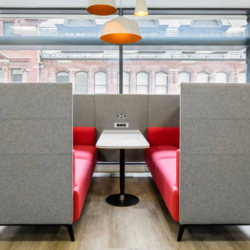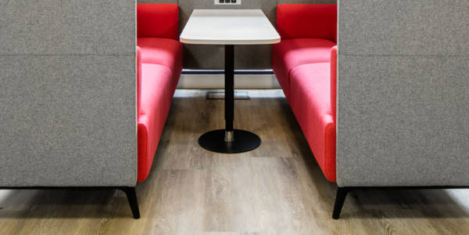October 15, 2020
Search Results for: hybrid
October 15, 2020
The office has the potential to adapt to meet new needs
by Jayne Smith • News, Working lives
 80 percent of us want to get back to the office, according to a new report from Dale Office Interiors, but only if they become more than just “places to work”. The research, which surveyed the opinions of UK employees and HR professionals, suggests a disconnect between what we believe offices should do, and the performance of our actual real-world offices – a problem HR heads feel is all the more stark now that we face a return to the office in a post-COVID world. (more…)
80 percent of us want to get back to the office, according to a new report from Dale Office Interiors, but only if they become more than just “places to work”. The research, which surveyed the opinions of UK employees and HR professionals, suggests a disconnect between what we believe offices should do, and the performance of our actual real-world offices – a problem HR heads feel is all the more stark now that we face a return to the office in a post-COVID world. (more…)
October 8, 2020
The workplace has reached an inflection point as it adjusts to new realities
by Robin Davies • Comment, Facilities management, Technology, Workplace design
 We can confidently say this is a new era for the workplace. Covid-19 has forced a radical rethink about the purpose of the office and its role in reaffirming company culture. Enlightened property directors are resisting knee-jerk responses to predictions that Covid spells the demise of the office including the wholesale migration to home-working. Instead, they are challenging plans to dramatically downsize the workplace and corporate real estate. They are also acutely aware that distancing, transmission and sanitisation are here for the long-haul. This will continue to have a profound impact on occupancy levels and the interactions that are necessary for business success. (more…)
We can confidently say this is a new era for the workplace. Covid-19 has forced a radical rethink about the purpose of the office and its role in reaffirming company culture. Enlightened property directors are resisting knee-jerk responses to predictions that Covid spells the demise of the office including the wholesale migration to home-working. Instead, they are challenging plans to dramatically downsize the workplace and corporate real estate. They are also acutely aware that distancing, transmission and sanitisation are here for the long-haul. This will continue to have a profound impact on occupancy levels and the interactions that are necessary for business success. (more…)
October 6, 2020
Majority of office workers plan to split their week between the office and home
by Jayne Smith • Flexible working, News, Working lives
 New independent polling commissioned by the British Council for Offices (BCO), suggests that, once Government measures allow, Britain is set to move to a ‘mixed’ working style, with time in the office balanced with time at home. The survey, which polled over 2,000 office workers nationwide, took place prior to new Government measures and found an appetite to get back to the office. (more…)
New independent polling commissioned by the British Council for Offices (BCO), suggests that, once Government measures allow, Britain is set to move to a ‘mixed’ working style, with time in the office balanced with time at home. The survey, which polled over 2,000 office workers nationwide, took place prior to new Government measures and found an appetite to get back to the office. (more…)
October 2, 2020
What (nearly) everybody gets wrong about work and the coronavirus
by Mark Eltringham • Comment, Flexible working, Workplace design
 You’ve probably read and heard dozens, or even hundreds, of different viewpoints about the effect of the pandemic on the world of work. Most of them (until recently perhaps) have dished up one of the two binary options as part of a zero-sum game. Many are based on hackneyed ideas and expressed as clichés. (more…)
You’ve probably read and heard dozens, or even hundreds, of different viewpoints about the effect of the pandemic on the world of work. Most of them (until recently perhaps) have dished up one of the two binary options as part of a zero-sum game. Many are based on hackneyed ideas and expressed as clichés. (more…)
October 2, 2020
Two thirds of people believe their work travel patterns have changed permanently
by Jayne Smith • Environment, News, Technology
 Alphabet (GB) has published a new report examining how the pandemic has accelerated changes to travel and transport, altering consumer and business travel habits in UK cities. With mass migration to working from home, in March, road traffic travel dropped to levels not seen since 1955 and journeys on the London Underground fell by 95 percent. The report suggests that only six percent of those travelling to work by train feel comfortable, dropping to just four percent for tube users. (more…)
Alphabet (GB) has published a new report examining how the pandemic has accelerated changes to travel and transport, altering consumer and business travel habits in UK cities. With mass migration to working from home, in March, road traffic travel dropped to levels not seen since 1955 and journeys on the London Underground fell by 95 percent. The report suggests that only six percent of those travelling to work by train feel comfortable, dropping to just four percent for tube users. (more…)
September 25, 2020
Furloughed employees feel less valued
by Jayne Smith • News, Wellbeing, Working lives
 A new survey published by Boston Consulting Group (BCG) claims that while 78 percent of those who experienced a change in workplace felt that they had experienced positive impacts, furloughed employees have had a significantly different experience. (more…)
A new survey published by Boston Consulting Group (BCG) claims that while 78 percent of those who experienced a change in workplace felt that they had experienced positive impacts, furloughed employees have had a significantly different experience. (more…)
September 23, 2020
Employees concern over the fairness of who returns to the office
by Jayne Smith • News, Working lives
 Fairness around office rota decisions and implementation is a top employee concern, claims new research by HSM. As employers now consider the impact of a second wave of Covid-19, the Government is now encouraging people to work from home and grapple with decisions around how and when to bring people back to the office. (more…)
Fairness around office rota decisions and implementation is a top employee concern, claims new research by HSM. As employers now consider the impact of a second wave of Covid-19, the Government is now encouraging people to work from home and grapple with decisions around how and when to bring people back to the office. (more…)
September 22, 2020
Back to the floor: how life on the stock exchange has changed
by Freddie Steele • Company news
 Let’s face it: there can’t have been many workplaces left untouched by the coronavirus pandemic. On the busy trading floors at the major stock exchanges and investment companies – and the big financial districts as a whole – life has changed considerably. (more…)
Let’s face it: there can’t have been many workplaces left untouched by the coronavirus pandemic. On the busy trading floors at the major stock exchanges and investment companies – and the big financial districts as a whole – life has changed considerably. (more…)
September 15, 2020
The case for net zero carbon buildings explored in new guidance
by Jayne Smith • Environment, News
 The UK Green Building Council (UKGBC) has published a new report, ‘Building the case for net zero: A feasibility study into the design, delivery and cost of new net zero carbon buildings’. Research earlier this year by JLL suggested that more sustainable buildings can have increased rental value of 6-11 percent and lower void periods. Also taking action now to make buildings fit for the future guards against assets being stranded by future regulation and avoids costly retrofit at a later date. (more…)
The UK Green Building Council (UKGBC) has published a new report, ‘Building the case for net zero: A feasibility study into the design, delivery and cost of new net zero carbon buildings’. Research earlier this year by JLL suggested that more sustainable buildings can have increased rental value of 6-11 percent and lower void periods. Also taking action now to make buildings fit for the future guards against assets being stranded by future regulation and avoids costly retrofit at a later date. (more…)
August 4, 2020
Boardroom heroes needed to transform working cultures
by Alex Fleming • Comment, Flexible working
 Even as the UK starts to open back up following the COVID-19 enforced lockdown, there are still many unanswered questions about how almost every aspect of our lives will be impacted. What is certain though, is that we will continue to see a paradigm shift take place across all areas of the workplace. Employers must ensure they have the right measures and policies in place to deal with the transformations that have taken place across the UK’s labour market throughout the lockdown period. This is crucial, as only those who have a strong workplace culture will succeed in the post-pandemic world. (more…)
Even as the UK starts to open back up following the COVID-19 enforced lockdown, there are still many unanswered questions about how almost every aspect of our lives will be impacted. What is certain though, is that we will continue to see a paradigm shift take place across all areas of the workplace. Employers must ensure they have the right measures and policies in place to deal with the transformations that have taken place across the UK’s labour market throughout the lockdown period. This is crucial, as only those who have a strong workplace culture will succeed in the post-pandemic world. (more…)






 With current government advice encouraging all those who can work from home to do so, it’s no surprise that Britain’s businesses and employees are navigating a new normal. New research from
With current government advice encouraging all those who can work from home to do so, it’s no surprise that Britain’s businesses and employees are navigating a new normal. New research from 

















October 14, 2020
The world may be going mad, but we don`t have to
by Mark Eltringham • Comment, Working culture